Yesterday, or perhaps tomorrow, time and space were playing by a new set of rules. Hours and minutes followed in mysterious patterns and one way streets changed direction in a blink. For this reason I find it easy to believe that as I wandered around Gion I may have been in some mezzanine hour in an alternative Kyoto were Geisha are non existent. Not a Geisha in sight though I searched far and wide and in my meanderings found myself in some pretty seedy alleys where there were elegantly dressed women, however their purpose was clearly of a far less reputable nature.
Though I didn't know where I was in relation to my hotel, I fancied a walk and so headed off in an unknown direction only to find myself at the hotel an hour later having stumbled over a curry of unspeakable awfulness and a Dutch cafe pumping out Thelonious Monk as fast as it could distill its fine brews.
I now find myself in a Starbucks by Kyoto railway station with enough minutes to kill for a bite to eat but not enough for another temple. Surrounded by a million other bloggers tapping away about whatever specifics of our lives we think may grab the reader.
I did head up Kyoto tower for a panoramic view of the city and in the process got a snap of the Kyoto station (in the foreground):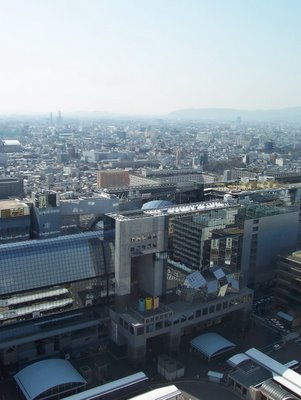
I also attempted to go to a Kimono showroom but was politely ejected as it was members only. Oops.
-----------------
In the free evenings here I've been reading more of the Sea of Cortez and my initial reaction has been replaced by a certain enlightenment. This is Steinbeck's own voice gobbling up information and taking in the reactions and personalities of the people that are met on this voyage with a voracity that only a man who could distill such observation to the strength and simplicity that he does in his novels could. Though I wouldn't recommend this book to anyone who hasn't read a fair number of his books, it does give a fascinating insight into where his power comes from. His punch comes from a keen eye and a deeply analytical mind which is hidden in his novels by the final concentrated punchline seeded in every character. I don't necessarily agree with everything he has to say on human nature, science (in particular his arguments about teleology take on rather Pythonesque proportions), politics, love or many of the other topics he goes into in this book but it's an eye opener into what molded such a fascinating person. I would recommend this to any Steinbeck enthusiast though be warned that it's in some ways very different from his fiction.
While I'm on the subject of interesting rhetoric, I want to mention somebody that I found out about yesterday. In 2001 a college dropout from Wellington, New Zealand wrote a paper on the nature of time and succeeded in getting it published in a major scientific journal. There was a lot of controversy surrounding who Peter Lynds really was but I shan't go into that. (Incidentally, there are many, many well known crackpots out there who put their papers on the web because they are rejected from journals. I'm not claiming that Peter is necessarily a crackpot but the whole story is pretty strange.)
I'm intrigued as to what the scientific community made of this paper at the time. I've done some digging and found that this paper has only five citations. Not a great number for a paper that purported to change our view of the nature of time but not bad for an unknown college dropout. His paper contains very little mathematics and indeed no proof of what he's trying to explain. Perhaps that's because the framework of what he's trying to say is not available mathematically and he truly has stumbled across a deep truth but I'm not convinced. It is a rather philosophical discourse on Zeno's paradox and the discreteness of time. He seems to be claiming that such results can explain quantum mechanics and solve Zeno's paradox in a trice. I'd thought that Zeno's paradox had been solved simply with the theories of Leibniz and Newton when the nature of infinitesimals were better understood.
In reviews of this work I find writers drawing parallels between Lynds' and Einstein's papers of 1905 and 1915. I find this parallel particularly strange because whereas Einstein gave us a simple mathematical framework by which a new understanding of the universe could be formulated. Peter's rhetoric seems to give nothing but some philosophical musings about consciousness and quantum mechanics. It could be science's failing (I don't think so) but mathematics is the language that we use to model our ideas to form testable theories which can probe or refute an idea. Explanatory musings are a good start and perhaps a good end but the middle must be filled with mathematics, the logic of which should be the most foolproof method of reasoning we have. I'd like to know from anyone who knows more about this paper whether it had any impact on science other than from a publicity point of view.
(OK, having read the paper again I think that it's purely metaphysical ramblings as opposed to pure science. It's all very well to postulate but rhetoric alone will not overturn firm scientific reasoning without many more people behind it.)
------------
So finally I get my view:
She hides, and lurks, taunting you briefly with a flash of snowy white flesh until suddenly at the instant of being spat from the belly of a mountain at 300 km/h into the blinding sunlight, Mount Fuji shows herself in one triumphant revelation and all her breathtakingly spectacular beauty. Mount Fuji is a stunningly awesome sight. Flanked by lowly minions, rising unrivalled in stature above the cityscape at her feet, a snowy peak covering the Platonic ideal of a volcanic slope, with a light halo of clouds dusting the crest. Naturally, photos don't do justice to this incredible sight and I urge you to see it for yourself, nay climb it if you get the chance. I haven't but I will one day. I'm doubly pleased to have seen this magnificent view as I seem to have a habit of going through places with some of the world's greatest wonders without seeing them. I've now been through Agra twice and not seen so much as a marbled corner of the Taj Mahal and going passed Mount Fuji twice without seeing her would have been the icing on the cake, or perhaps the lack of it. Anyway, I wanted to write that having just been passed only moments ago while the image is still fresh. I think it will be for some time. Excuse the verbose posturing but it is truly one of the most amazing views I've ever been lucky enough to see.
I took a vast number of photos balanced precariously as the train swayed gently. Many were fuzzy and these I think are the best.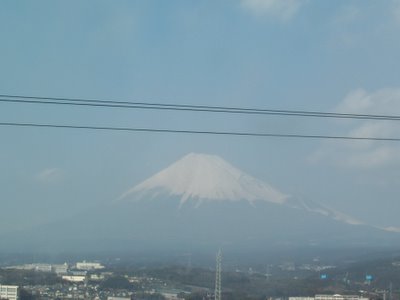
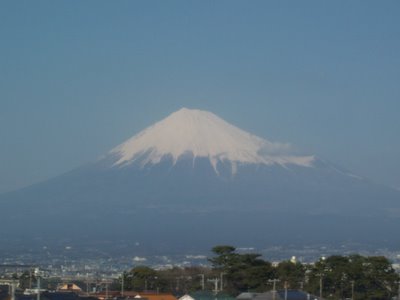
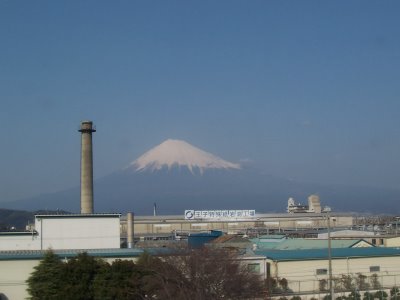
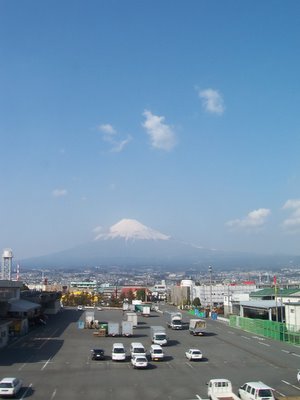
Sunday, March 05, 2006
Subscribe to:
Post Comments (Atom)
1 comment:
Hi P,
Sorry for the belated reply. I shall just have to return to see the Geisha along with many many other things that I didn't get to see this time.
Chat soon,
J x
Post a Comment